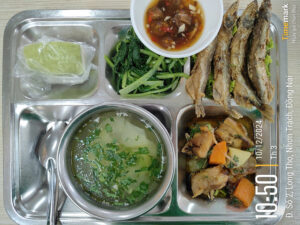Understanding VAT Rates for Providing Industrial Meals to Export Processing Enterprises
As an accountant in the industrial meal service industry, understanding the regulations on Value-Added Tax (VAT) rates is crucial. This knowledge ensures legal compliance, financial transparency, and minimizes risks during tax audits. So, how is VAT applied when providing meals to export processing enterprises (EPEs)?

1. VAT Rates for Providing Meals to Export Processing Enterprises
According to Point b, Clause 1, Article 9 of Circular 219/2013/TT-BTC, industrial meal services provided to export processing enterprises are classified as exported goods and services. Therefore, a 0% VAT rate applies if the following conditions are met:
- Contract: A service agreement exists between the meal provider and the export processing enterprise.
- Payment: Payments are made via bank transfer, with no cash transactions.
- Documentation: Invoices, documents, and related paperwork must be complete and accurate.
2. Conditions to Apply the 0% VAT Rate
To ensure the 0% VAT rate is applied, businesses must meet these requirements:
- Clear economic contracts:
- Contracts must explicitly detail the provision of meals to the export processing enterprise, including quantities and values.
- Bank transfer documentation:
- Payments must be made through bank transfers, avoiding cash transactions.
- VAT invoices:
- VAT invoices must specify a 0% tax rate, payment amounts, and be accompanied by export-related documents.
- Proof of export services:
- Reports detailing the use of raw materials, food, and labor related to the service provided to the export processing enterprise.
3. Cases Where 8% or 10% VAT Rates Apply
- 8% VAT Rate (Temporary Tax Reduction Policy):
In specific circumstances in Vietnam, VAT may be temporarily reduced to 8% under government resolutions to support businesses. This often applies during economic difficulties or as part of economic stimulus policies. - 10% VAT Rate:
If a business fails to meet the conditions for the 0% VAT rate, the standard 10% VAT rate for domestic services will apply.
👉 Note: The 8% VAT reduction is time-limited and depends on current government policies. Businesses must stay updated with tax authority announcements.
4. Optimized Practices from Hiepphatfood
As a professional industrial meal service provider, Hiepphatfood ensures:
- Transparent and complete contracts and documentation.
- Compliance with legal payment processes through bank transfers.
- A team of experienced accountants to ensure accurate tax reporting and timely filing.
- Regular updates on tax policies, including VAT rate reductions to 8%.
5. Benefits of Applying the Correct VAT Rate
Understanding and applying the correct VAT rate helps businesses:
- Reduce tax costs: Maximize tax incentives.
- Enhance credibility: Demonstrate professionalism and transparency in operations.
- Avoid legal risks: Ensure compliance with tax regulations from authorities.
Conclusion
Providing industrial meals to export processing enterprises offers many opportunities but requires a deep understanding of tax regulations. With a professional accounting team and transparent processes, Hiepphatfood is ready to partner with export processing enterprises to deliver high-quality services while ensuring legal compliance.
👉 Contact Hiepphatfood today for detailed advice on industrial meal services and tax optimization solutions! 💼
For additional information, you can refer here:
VAT Rates for Providing Meals to Export Processing Enterprises


 VN
VN